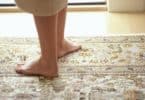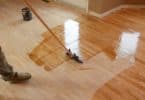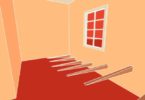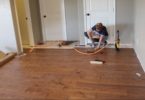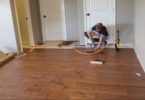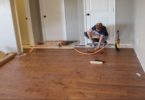Engineered wood floors, laminate wood floors, snap-in wood floors, whatever name the manufacturer chooses to use, these floors have exploded in popularity. The boards are comprised of a type of press board, covered with a thin veneer of real wood. This two-ply construction allows the boards to breathe a bit, expanding and contracting with minimal exposure to humidity. They are easy to install, requiring few tools. The laminates come in a variety of woods, tones, and shapes. Once installed, they are a durable, beautiful, affordable addition to any home.
With proper cleaning and maintenance, engineered wood floors will last many years. Follow these easy steps to keep the floor looking and functioning well.
Spills
Clean spills as soon as they occur. Just like hardwood floors, engineered wood floors are not designed for prolonged exposure to moisture. Additionally, some liquids can stain the laminate floor if they are left in place too long as they can work their way in between the layers of particleboard and veneer. Once this occurs, it is necessary to replace the stained boards, rather than to try to clean the stain.
Area Rugs
Area rugs are an excellent way to protect the high-traffic areas of the floor from hazards such as high heels and damaging scuffmarks. However, they can also trap fine dirt and dust onto the floor. Lift areas rugs and clean under them regularly. This dirt can scratch the floor every time someone steps on the area rug if it is not removed regularly. For floors that lead to an outside exit, consider placing mats, both inside and outside the door. This will help to remove excess dirt from shoes, prior to entering the house and stepping on the laminate floor.
Sweep Regularly
Use a soft bristled broom or a dust mop to sweep the floor two or three times per week. This activity will prevent larger dirt particles from begin ground into and scratching the surface of the floor. It will also remove finer dirt that can act as sandpaper to the floor’s finish if subjected to heavy foot traffic. If there are pets in the house, this is especially beneficial to keep the dust bunnies at bay.
Vacuum
Use a soft brush vacuum cleaner to vacuum the floor once a week. This activity will remove the finer particles of dirt and dust that can accumulate in the cracks and floor joints. If left unattended, dirt and dust could compromise the floor’s seal, causing the boards to shift or buckle.
Light Mop
Periodically, the floor will appear soiled even with regular sweeping and vacuuming. When the floor’s shine begins to dull use a damp mop and a small amount of cleaner. It will help to restore the floor to its original luster. The key to this deeper cleaning is that the mop must be damp, not soaking wet. The goal is to remove the thin layer of film, not to soak the wood thoroughly. The floor should be slightly damp while mopping and thoroughly dry within minutes.
Heavy Mop
Periodically, kids, pets, spouses, and other acts of God and Nature leave the floor heavily soiled. Use a straightforward cleaning solution consisting of one part white vinegar and three parts hot water, damp mop the floor. Be sure to wring the mop thoroughly before applying to the floor, as excessive moisture is the enemy of wood. The hot water will loosen the soil, and the white vinegar is an excellent cleansing agent. Because the solution is so diluted, the vinegar will not leave an odor. Because white vinegar is such a strong cleaner, the floor will dry to bright, streak free shine.


